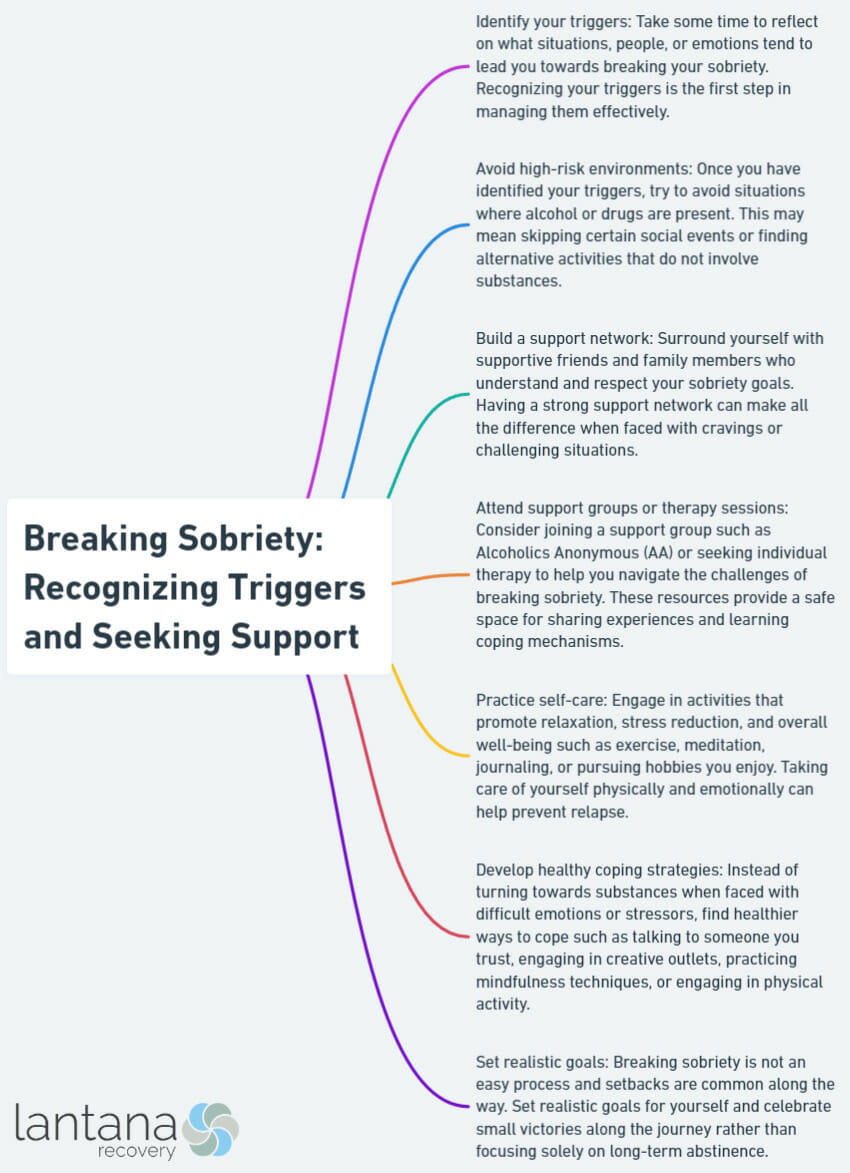Breaking sobriety and relapsing can be a challenging and disheartening experience for individuals on a journey of recovery. Recognizing triggers and seeking support are essential steps in maintaining sobriety and preventing relapse. This article aims to provide guidance and insights into these aspects of the recovery process.
To better understand the significance of breaking sobriety, it is crucial to comprehend the concept of sobriety itself. Being sober refers to a state of abstaining from the use of harmful substances, such as alcohol or drugs, and living a substance-free lifestyle. Sobriety is not just about abstaining from substance use but also encompasses physical, emotional, and mental well-being.
Understanding why sobriety is important can serve as a motivation for individuals striving to maintain a sober lifestyle. Sobriety offers numerous benefits, including improved physical health, better mental clarity, enhanced relationships, increased productivity, and the opportunity to live a fulfilling life free from the negative effects of substance abuse.
One of the critical aspects of maintaining sobriety is recognizing triggers. Triggers are situations, emotions, or stimuli that can lead to the desire to use substances and potentially cause a relapse. Identifying personal triggers involves understanding one’s specific vulnerabilities and being aware of situations or emotions that may lead to cravings or a desire to escape through substance use. External triggers, such as certain people, places, or social settings, can also pose risks for individuals in recovery.
Recognizing the importance of support is crucial in the journey towards maintaining sobriety. Various types of support are available, including professional therapy, counseling, and support groups. These support systems provide individuals with guidance, understanding, and encouragement through the recovery process. Seeking help from support groups, such as Alcoholics Anonymous (AA) or Narcotics Anonymous (NA), can offer a sense of community, connection, and shared experiences that can greatly aid in maintaining sobriety.
In addition to recognizing triggers and seeking support, implementing strategies for maintaining sobriety is essential. Finding healthy coping mechanisms to deal with stress and negative emotions is crucial in preventing relapse. Building a strong support network of individuals who understand and support one’s sobriety goals can provide the necessary encouragement and accountability. Creating a relapse prevention plan that outlines strategies for managing triggers and implementing self-care practices is also vital in maintaining long-term sobriety.
Lastly, setbacks can happen on the road to recovery. Recognizing the signs of relapse is crucial in catching it early and taking appropriate actions to get back on track. Getting back on track after a relapse involves acknowledging the setback, seeking support, reevaluating the relapse prevention plan, and reinforcing commitment to sobriety.
By understanding and addressing triggers, seeking support, implementing strategies for sobriety maintenance, and learning how to cope with setbacks, individuals can overcome challenges and maintain their journey of sobriety with strength, resilience, and hope.
Understanding Sobriety
Understanding sobriety is crucial for individuals recovering from addiction. It involves comprehending addiction’s nature, recovery challenges, and the importance of ongoing support.
|
– Addiction is a chronic disease that affects behavior and the brain. It is characterized by compulsive drug or alcohol use, despite negative consequences. |
|
– Sobriety is abstaining from drugs or alcohol and is essential for overcoming addiction. |
|
– Recovering from addiction requires a holistic approach, addressing physical, psychological, and social aspects of life. |
|
– Understanding triggers is important in sobriety. Triggers are people, places, or situations that provoke cravings and may lead to relapse. |
|
– Building a strong support system is vital for maintaining sobriety. This includes seeking support from friends, family, therapists, and support groups. |
|
– Recovery is a lifelong process. It requires ongoing commitment, self-reflection, and adopting healthy coping mechanisms. |
Now, let me share a true story that reflects the challenges and triumphs of understanding sobriety:
Mark, a 35-year-old recovering alcoholic, struggled with addiction for years. After hitting rock bottom, he sought help and enrolled in a rehabilitation program. Through therapy and support groups, Mark gained a deep understanding of his triggers and learned healthier ways to cope with stress and emotional pain. He cultivated a strong support system, leaning on his family and attending regular AA meetings. Today, Mark celebrates five years of sobriety, living a fulfilling and purposeful life. His understanding of sobriety continues to grow as he remains committed to his recovery journey.

What Does it Mean to Be Sober?
To understand what it means to be sober, it’s important to acknowledge the decision to abstain from alcohol or drugs. By prioritizing one’s well-being and embracing a healthy lifestyle, individuals can truly embody sobriety. The significance of sobriety lies in enhancing personal safety and fostering better physical and mental health. The detrimental effects of alcohol and drugs on the body and mind make it even more crucial to choose a sober path, as it ultimately promotes overall well-being.
Sustaining sobriety necessitates a robust support system and effective coping mechanisms. It is vital to identify personal triggers and develop healthy ways to address them. Encouragement and accountability can be found within support networks such as friends, family, and support groups.
For those in recovery, creating a relapse prevention plan is paramount. This plan should encompass various strategies to steer clear of or combat situations that may pose a risk to one’s sobriety. By being attuned to the warning signs of relapse and taking appropriate actions, individuals can effectively maintain their progress on the road to recovery.
Why is Sobriety Important?
Sobriety plays a crucial role in both well-being and quality of life. Understanding the significance of why sobriety is important empowers individuals to make informed decisions. So, let’s dive into the reasons why sobriety holds such significance:
1. Enhanced Physical Health: Sobriety grants the body the opportunity to heal from substance abuse, thus minimizing the risk of severe health issues like liver disease, cardiovascular problems, and organ damage.
2. Improved Mental Well-being: Sobriety contributes to an overall better state of mental health, reducing the chances of anxiety, depression, and psychosis. It cultivates mental clarity, emotional stability, and improved coping abilities.
3. Strengthened Relationships: Addiction tends to strain relationships with family, friends, and loved ones. However, sobriety provides individuals with the chance to rebuild trust and mend damaged connections, fostering healthier and more fulfilling relationships.
4. Increased Productivity: Substance abuse hampers productivity and work performance, but sobriety fuels focus, motivation, and energy to conquer personal and professional goals.
5. Promotion of Personal Growth: Sobriety unlocks the door to personal growth and self-improvement. It creates opportunities for individuals to develop new interests, hobbies, and embrace healthier coping mechanisms, thereby enriching their lives.
By recognizing the importance of sobriety, individuals can break free from addiction, seek the necessary support, and ultimately lead happier and healthier lives.

Recognizing Triggers
Recognizing triggers is an essential step in maintaining sobriety. In this section, we dive into the world of triggers, both personal and external, that have the potential to challenge our efforts towards recovery. By understanding and identifying these triggers, we can develop effective strategies to navigate them and seek the support we need. So, let’s explore the powerful impact triggers can have on our journey to sobriety and learn how to tackle them head-on.
Identifying Personal Triggers
Identifying personal triggers is essential for maintaining sobriety. Recognizing the factors that can lead to a relapse empowers individuals to develop effective coping strategies. When it comes to identifying personal triggers, here are some key points to consider:
1. Emotional triggers: It is important to recognize that stress, loneliness, and boredom can increase the urge to use substances.
2. Social triggers: Pay attention to certain social situations or specific individuals that may act as triggers.
3. Environmental triggers: Be aware of places or situations associated with substance use, such as bars or parties, as they can serve as triggers.
4. Negative thinking patterns: Take into account negative thoughts, self-doubt, and pessimism, as they can contribute to relapse.
5. Reflection on past experiences: Evaluate previous relapses and the circumstances that led to them.
6. Seeking professional guidance: Collaborate with a therapist or counselor who specializes in addiction to identify personal triggers and develop effective coping mechanisms.
By actively identifying personal triggers, individuals can proactively avoid or effectively manage situations that may jeopardize their sobriety. Self-awareness and support are crucial for maintaining a healthy and substance-free lifestyle.
External Triggers to be Aware Of
When it comes to maintaining sobriety, be aware of external triggers that may increase the risk of relapse. These triggers can vary, but being mindful helps stay on track. Here are some external triggers:
- Social settings: Being in environments where alcohol or drugs are available can be a trigger, such as parties, bars, or clubs.
- Peer pressure: Being around friends or acquaintances who use substances can be tempting and may lead to cravings.
- Stressful situations: High stress levels may lead to wanting to escape or cope through substance use.
- Emotional triggers: Feelings like sadness, anger, or boredom can make you vulnerable to turning to substances for comfort or distraction.
- Triggers from past experiences: Places, people, or objects associated with past substance use may cause strong cravings.
- Identify and acknowledge these external triggers as part of your recovery journey. By recognizing them, develop strategies to avoid or cope effectively.
- Fact: A study published in the Journal of Substance Abuse Treatment shows that individuals who are aware of their external triggers and have strong coping skills are more likely to maintain sobriety long-term.

The Importance of Support
In the journey of breaking sobriety, having a solid support system makes all the difference. We’ll explore the significance of support in this section, diving into various types of available assistance and the value of seeking help from support groups. With their unwavering understanding and guidance, these sources of support can serve as beacons of hope and provide strength during challenging times. So, let’s unearth the power of support in maintaining sobriety and how it propels individuals towards a healthier, happier life.
Types of Support Available
When it comes to maintaining sobriety, having the right support can make a significant difference. There are various types of support available such as therapy, 12-Step Programs like Alcoholics Anonymous (AA) or Narcotics Anonymous (NA), outpatient treatment, sober living homes, peer support groups like SMART Recovery or LifeRing, and family and friends who understand and encourage sobriety. Each person’s journey is unique, and finding the right combination of support is essential. Some individuals may benefit from a combination of different types of support, while others may find success with just one. It’s also worth exploring different options to see what resonates best with personal needs and preferences.
Seeking Help from Support Groups
Seeking help from support groups can significantly boost your chances of long-term sobriety and provide valuable emotional support. Support groups offer a safe and non-judgmental environment where you can connect with people who understand the challenges and emotions that come with sobriety.
Being part of a support group allows you to learn from others who have already made progress in their sobriety journey. They can share tips, strategies, and insights to help you navigate difficult times. Additionally, support groups provide a sense of accountability as you share your goals and progress with others. They can keep you motivated, celebrate your victories, and offer encouragement during setbacks.
Support groups also offer an opportunity to build a strong support network of individuals who understand the challenges of maintaining sobriety. These connections can provide ongoing support beyond group meetings.
Lastly, support groups often have resources and information about rehabilitation centers, therapists, and other professional help that can supplement your journey towards sobriety. Remember, you don’t have to face this journey alone. There are people ready to offer guidance, understanding, and encouragement to help you on your path to recovery.

Strategies for Maintaining Sobriety
Navigating the path to sobriety requires more than just willpower; it demands a strategic approach. In this section, we’ll uncover effective strategies for maintaining sobriety. We’ll explore the importance of finding healthy coping mechanisms, building a strong support network, and creating a comprehensive relapse prevention plan. With these powerful tools at your disposal, you’ll be better equipped to overcome triggers and stay on the road to lasting recovery.
Finding Healthy Coping Mechanisms
Finding healthy coping mechanisms is crucial for maintaining sobriety. Here are some suggestions to discover these mechanisms:
– Engage in regular physical exercise. Exercise not only improves physical health but also enhances mood and reduces cravings, thereby aiding in finding healthy coping mechanisms. – Practice mindfulness and meditation. These techniques can help increase awareness of thoughts and emotions, enabling individuals to respond in a healthier manner and find effective coping mechanisms. – Develop a supportive system. Surrounding yourself with understanding friends, family, or members of a support group will contribute to finding healthy coping mechanisms. – Explore creative outlets. Engaging in activities such as painting, writing, or playing music can provide a healthy outlet for emotional expression and stress relief, contributing to finding healthy coping mechanisms. – Establish a self-care routine. Setting aside time for relaxing activities like taking baths, reading, or pursuing hobbies is an important part of finding healthy coping mechanisms. – Seek professional help when needed. Consulting a therapist or counselor who specializes in addiction recovery can offer targeted guidance and support, facilitating the discovery of effective coping mechanisms.
Remember, finding healthy coping mechanisms is a personal journey. It is essential to experiment with different strategies to identify what works best for you. By discovering the right coping mechanisms, you can achieve a fulfilling and sober life.
Building a Support Network
Building a support network is absolutely essential when it comes to maintaining sobriety and ensuring long-term success in recovery. It’s important to surround yourself with trustworthy and supportive individuals who truly understand and support your journey. Here are a few steps that can assist you in building a strong support network:
1. Identify supportive individuals: Take the time to reach out to those family members, close friends, counselors, or therapists who have been consistently supportive throughout your recovery process.
2. Join a support group: Consider actively participating in groups like Alcoholics Anonymous or SMART Recovery, as they provide a safe and understanding environment where you can connect with others who are going through similar experiences.
3. Attend therapy or counseling sessions: Individual therapy can play a crucial role in helping you work through any underlying issues and provide you with the much-needed support you require.
4. Engage in sober activities: It’s beneficial to involve yourself in activities that promote sobriety, such as attending sober parties or joining sober sports leagues. This will help you connect with like-minded individuals who are equally committed to living a sober life.
5. Stay connected virtually: In today’s digitally connected world, it’s a good idea to join online sobriety forums, follow recovery-focused social media accounts, and participate in virtual support meetings. These platforms can provide you with additional support and the opportunity to interact with others who share your journey.
Always remember that building a support network takes time and effort. Don’t hesitate to reach out and connect with individuals who can offer guidance, understanding, and encouragement as you continue on your path to sobriety.
Creating a Relapse Prevention Plan
- Educate yourself: Learn warning signs and triggers for relapse. Understanding these factors helps prevent them.
- Identify personal triggers: Recognize unique triggers like stress, negative emotions, or specific environments. Develop strategies to avoid or cope with them effectively.
- Establish a support system: Surround yourself with friends, family, or support groups who understand your sobriety journey. Having someone to lean on during challenging times is crucial.
- Develop healthy coping mechanisms: Find healthy ways to deal with stress and negative emotions that don’t involve substance use. This could include exercise, meditation, therapy, or engaging in fulfilling hobbies.
- Create a daily routine: Structure your day with healthy habits, self-care, and positive outlets. By reducing idle time and establishing purpose, you decrease the likelihood of relapse.
- Set realistic goals: Establish short-term and long-term goals aligned with your sobriety journey. These goals boost motivation and reinforce your commitment to staying sober.
- Develop a relapse prevention plan: Design a step-by-step plan for high-risk situations or intense cravings. This plan should include reaching out to your support system, using coping strategies, and seeking professional help if necessary.
- Stay accountable: Regularly evaluate progress and reassess the relapse prevention plan. Keep track of triggers and close calls. Learn from experiences to refine the plan if needed.
Dealing with Setbacks
Experiencing setbacks while on the path to sobriety can be incredibly disheartening. In this section, we’ll explore effective strategies for dealing with those inevitable bumps on the road to recovery. From recognizing the warning signs of relapse to finding ways to get back on track, we’ll provide you with actionable insights and practical advice to help you navigate through these challenges. So let’s dive in and equip ourselves with the tools needed to overcome setbacks and stay on the path to a healthier, sober life.
Recognizing the Signs of Relapse
Recognizing the signs of relapse is crucial for maintaining sobriety. By being aware of these indicators, individuals can take necessary steps to prevent a relapse and seek support when needed.
One key sign of relapse is increased cravings. Strong desires or urges to use substances are common indicators. Recognizing these cravings early on can help individuals implement coping strategies or reach out for support.
Another sign to watch out for is returning to old habits. This includes falling back into old routines, hanging out with old friends who still use substances, or visiting places associated with substance use. Recognizing these familiar patterns can help individuals make changes to avoid triggering situations.
Changes in mood and behavior can also indicate a potential relapse. Sudden shifts in mood, increased irritability, anxiety, or depression may be warning signs. These emotional changes can result from internal struggles or external stressors, making it important to address these issues promptly.
Isolation and withdrawal are red flags for relapse. Withdrawing from social activities, avoiding contact with loved ones, and isolating oneself can be indicators. It is crucial to reach out for support and connect with a supportive network when feelings of isolation arise.
Neglecting self-care is another sign to be aware of. Failing to care for oneself physically, emotionally, or mentally can indicate a relapse. This may manifest in poor hygiene, lack of sleep, neglecting responsibilities, or engaging in risky behaviors. Recognizing the importance of self-care and seeking help is essential during this time.
By being vigilant and acknowledging these signs, individuals can take proactive measures to prevent a relapse. Seek support from loved ones, attend support groups, and utilize healthy coping mechanisms to maintain a sober lifestyle. Remember, recognizing the signs of relapse is a crucial step towards long-term recovery.
Getting Back on Track after a Relapse
Getting back on track after a relapse can be challenging, but it is possible. Here are steps to help you regain your sobriety:
1. Reflect on the relapse: Understand the reasons behind your relapse. Identify triggers or situations that led to it. This self-reflection will help you make changes and prevent future relapses.
2. Reach out for support: Ask for help from your support network, whether it’s friends, family, or a support group. They can provide guidance, encouragement, and accountability.
3. Create a new plan: Evaluate your relapse prevention plan and make necessary adjustments. Identify strategies and coping mechanisms that have worked in the past and implement them into your daily routine.
4. Focus on self-care: Take care of your physical and mental well-being. Engage in joy-bringing activities and reduce stress. Regularly exercise, practice mindfulness or meditation, and maintain a healthy lifestyle.
5. Avoid triggers: Be mindful of situations or people that may trigger cravings. Take steps to avoid these triggers or develop coping strategies.
6. Stay committed: Maintain your commitment to sobriety and remind yourself of your reasons for wanting to stay clean. Surround yourself with positive influences and stay motivated towards your recovery goals.
Remember, getting back on track after a relapse is a process and may take time. Stay focused on your recovery journey and be compassionate towards yourself. With determination and support, you can regain your sobriety and continue on the path to a healthier life.
Frequently Asked Questions
What are some common relapse triggers in addiction recovery?
Some common relapse triggers in addiction recovery include specific time of year, challenging emotions, new jobs or promotions, romantic relationships, social isolation, and high-risk situations.
How can professional therapy help in identifying and managing triggers?
Professional therapy can help individuals identify and manage triggers by providing guidance, support, and tools for self-reflection. Therapists can assist in uncovering underlying issues and developing effective coping strategies specific to each individual’s triggers.
What is the importance of professional assessment in breaking sobriety?
Professional assessment is important in breaking sobriety as it helps individuals understand their unique triggers and develop personalized treatment plans. A thorough assessment allows for a comprehensive understanding of the individual’s addiction history and mental health, guiding the development of an effective relapse prevention plan.
How can online therapy be beneficial for individuals struggling with triggers?
Online therapy provides a convenient and accessible platform for individuals struggling with triggers to seek professional help. Through online therapy, individuals can receive guidance, support, and evidence-based treatment strategies to manage triggers and maintain sobriety.
What are some healthy coping strategies to help individuals cope with triggers?
Some healthy coping strategies to help individuals cope with triggers include mindfulness techniques, meditation, exercise, seeking social support, and practicing self-care. Engaging in these activities can help redirect attention away from triggers and promote overall well-being.
Why is it important to understand and recognize triggers in addiction recovery?
It is important to understand and recognize triggers in addiction recovery as they can lead to relapse. By identifying triggers, individuals can develop effective strategies and make informed choices to prevent relapse, maintain sobriety, and establish a solid foundation for long-term recovery.








